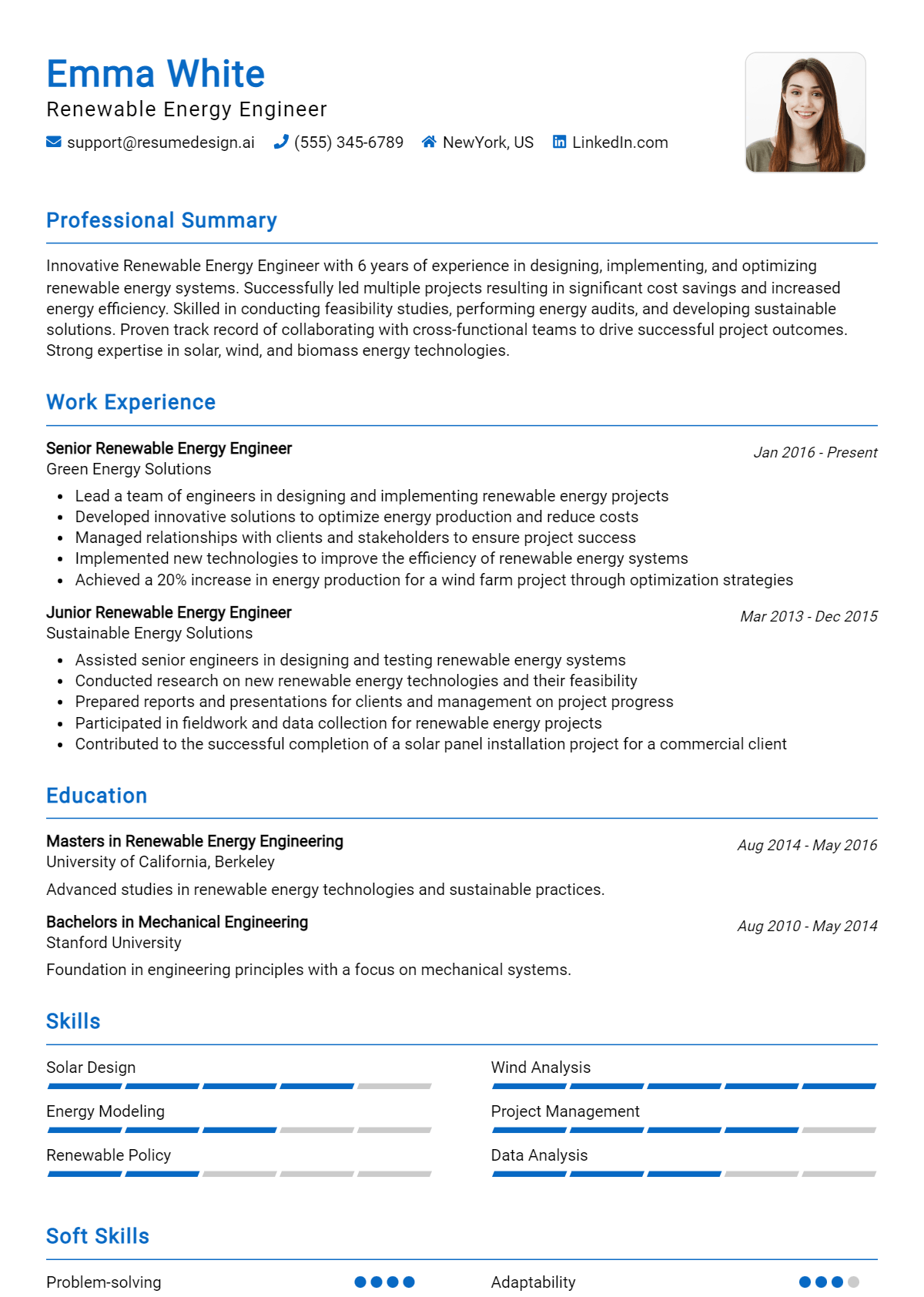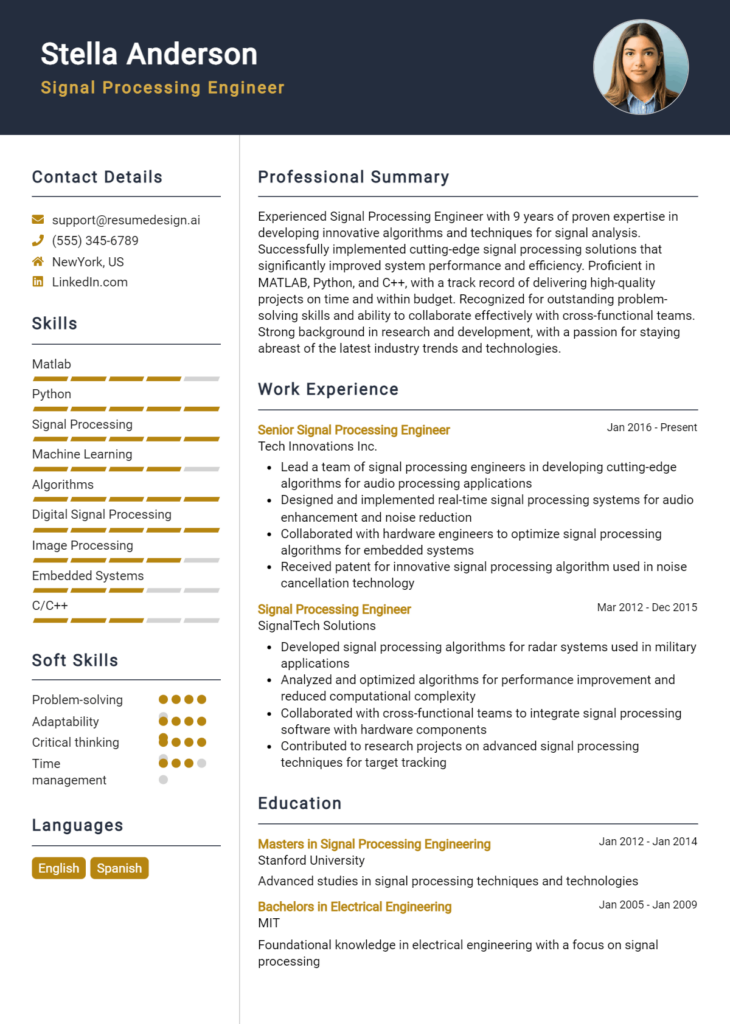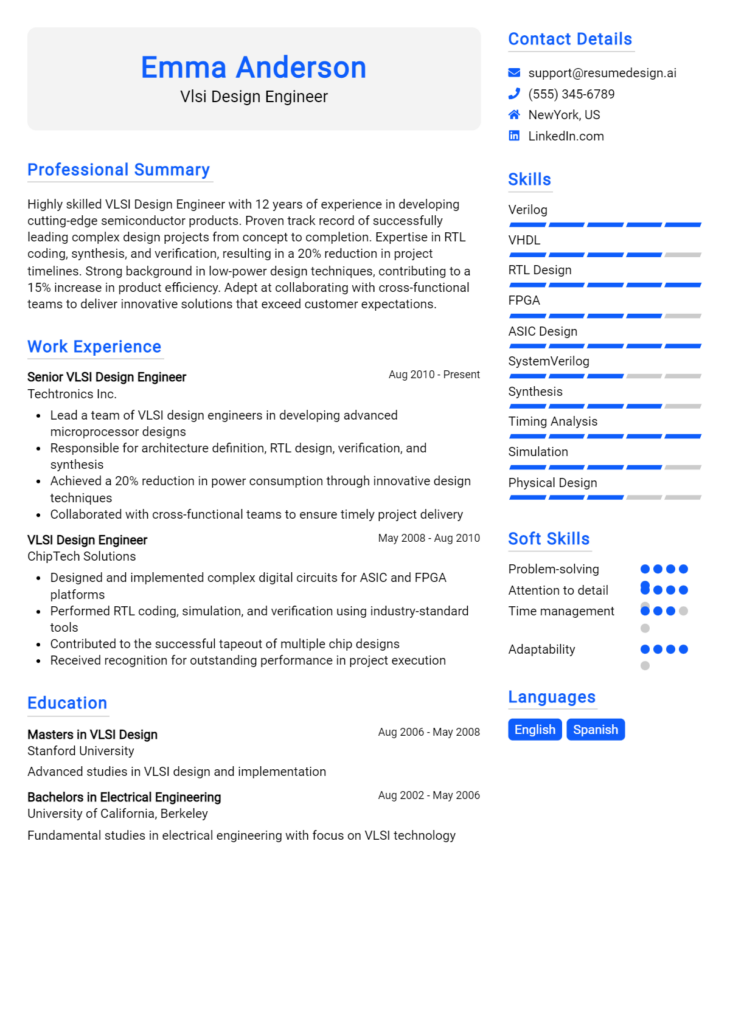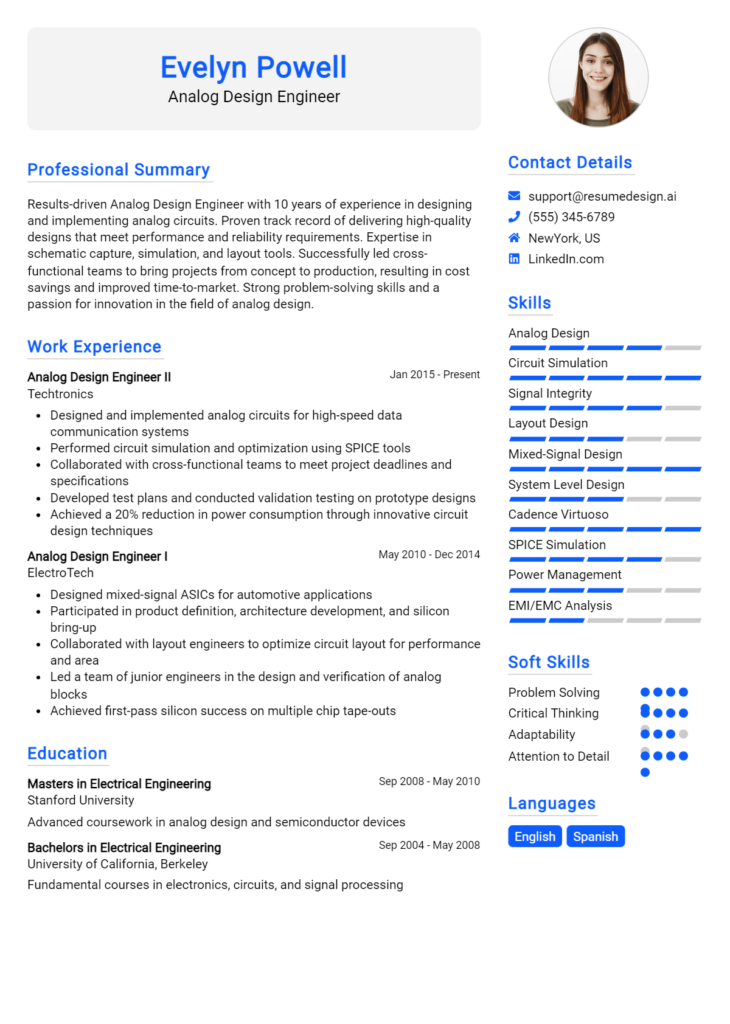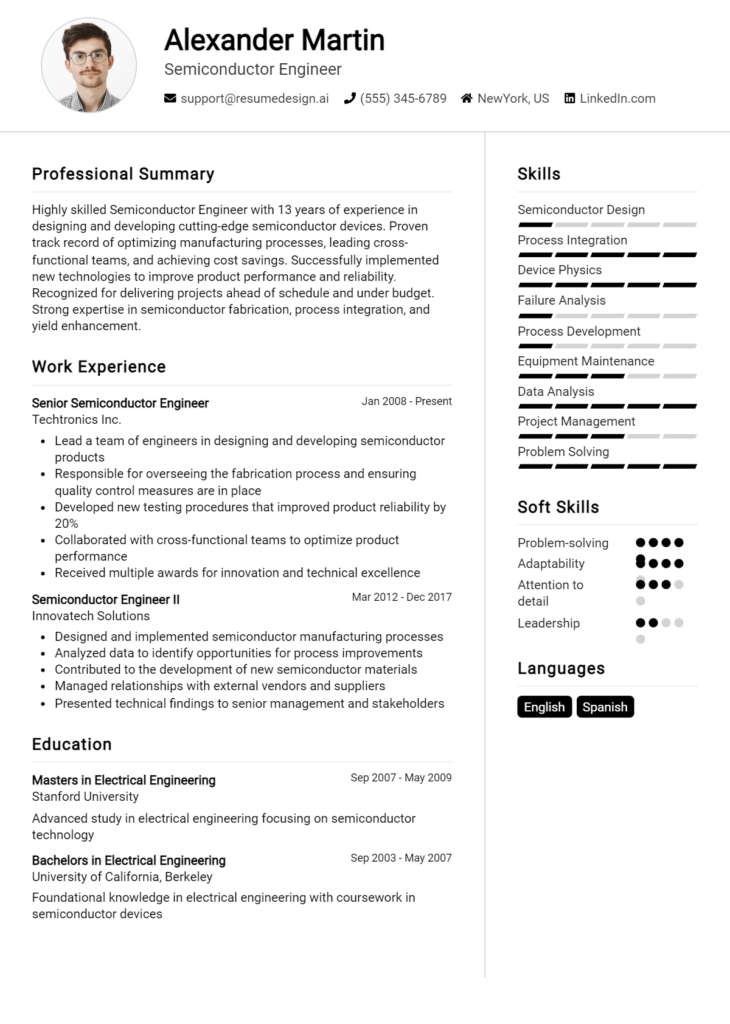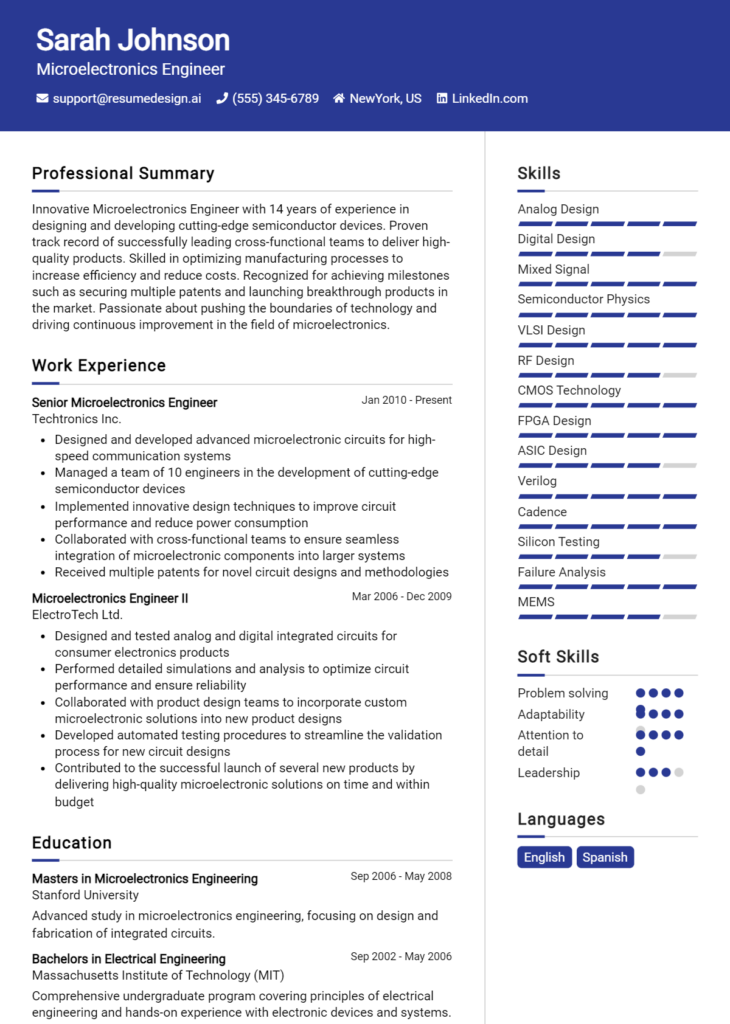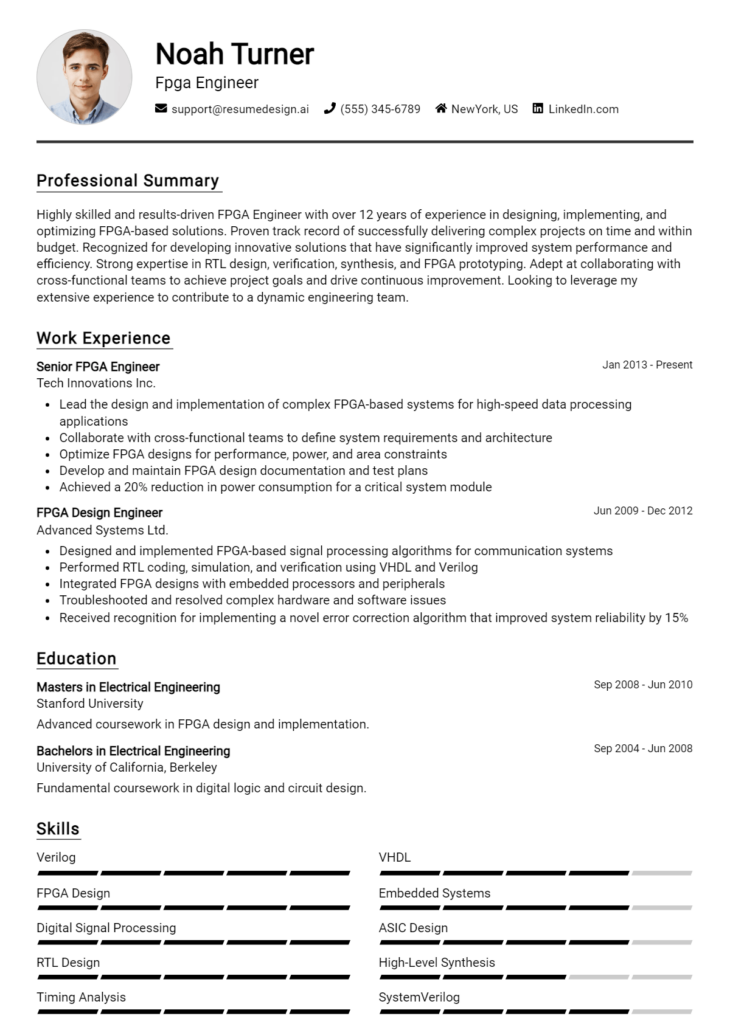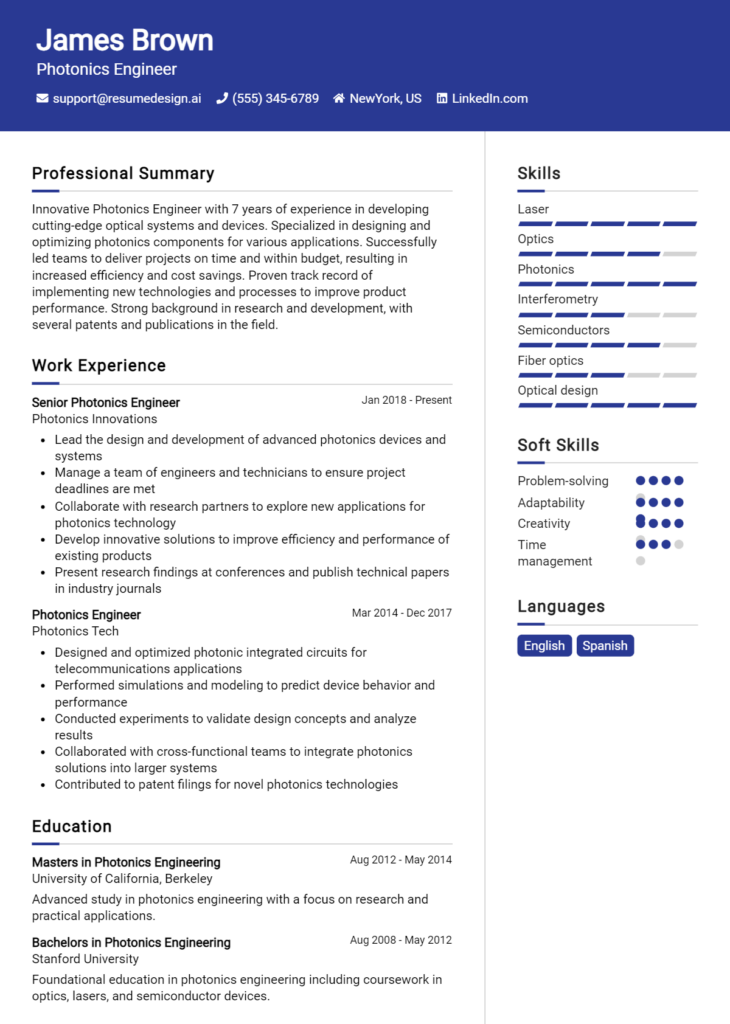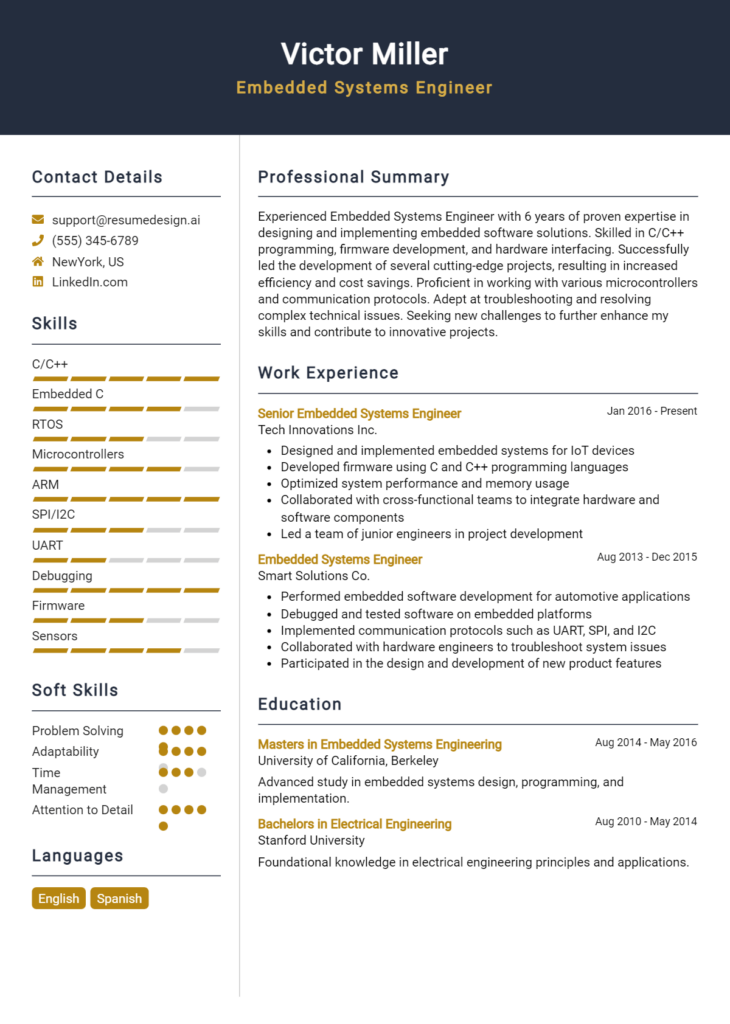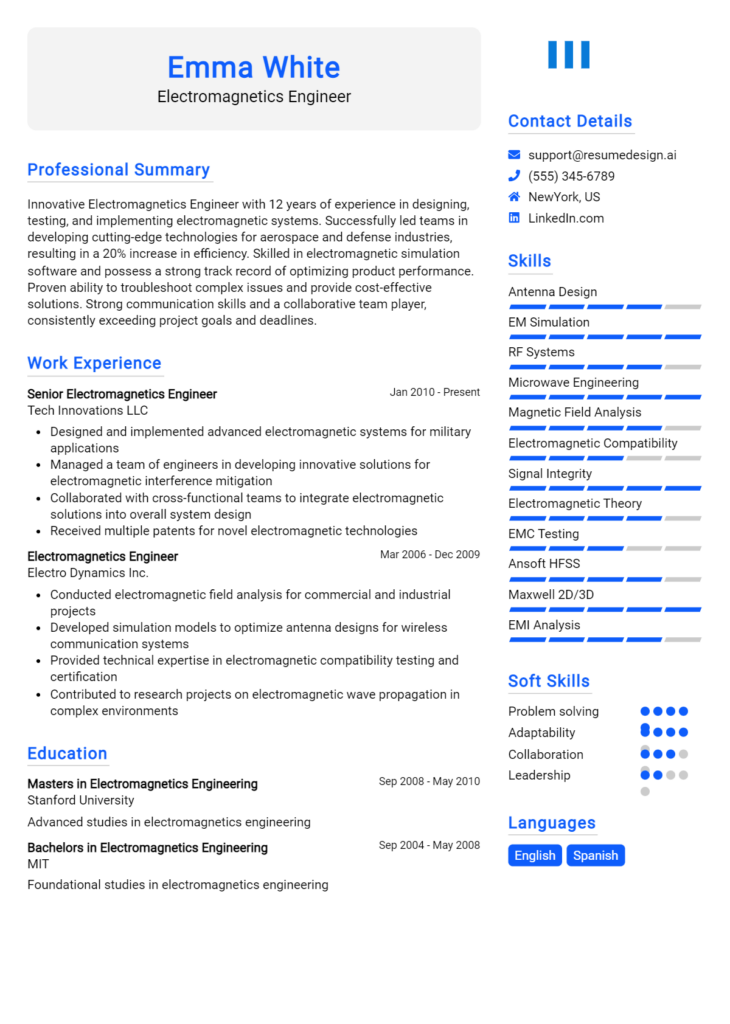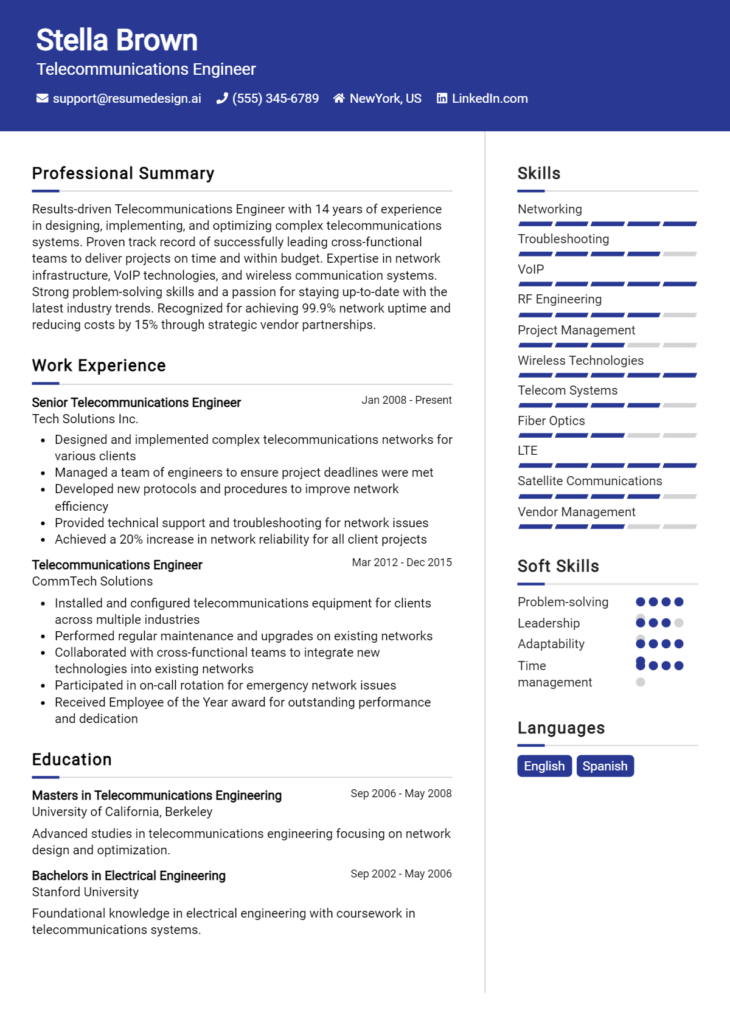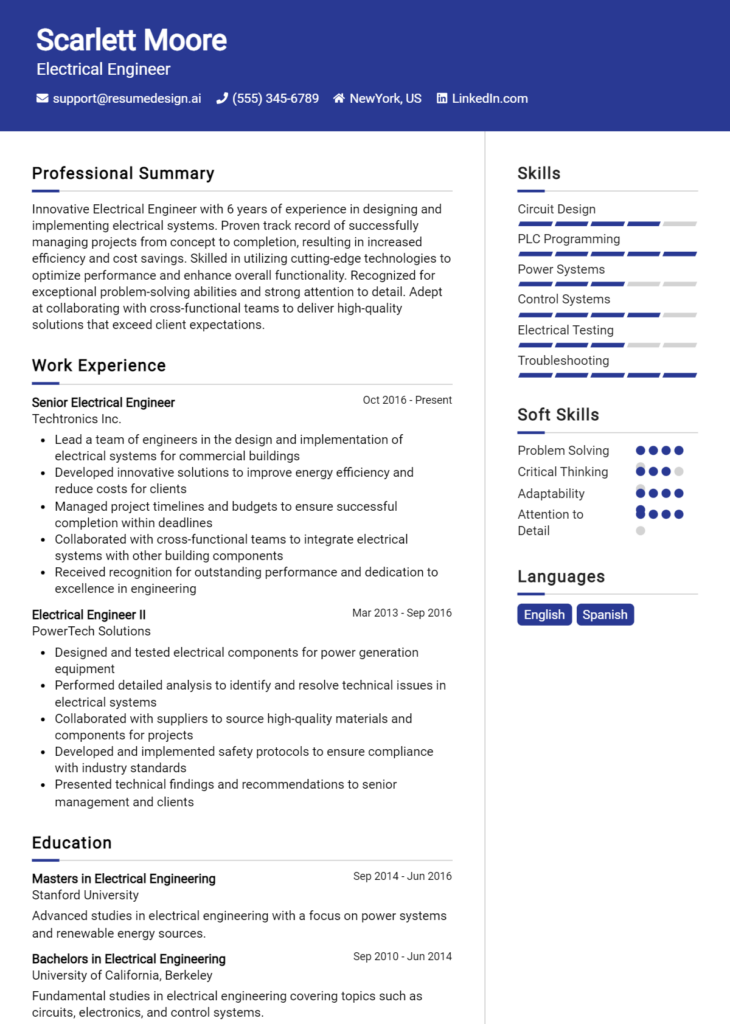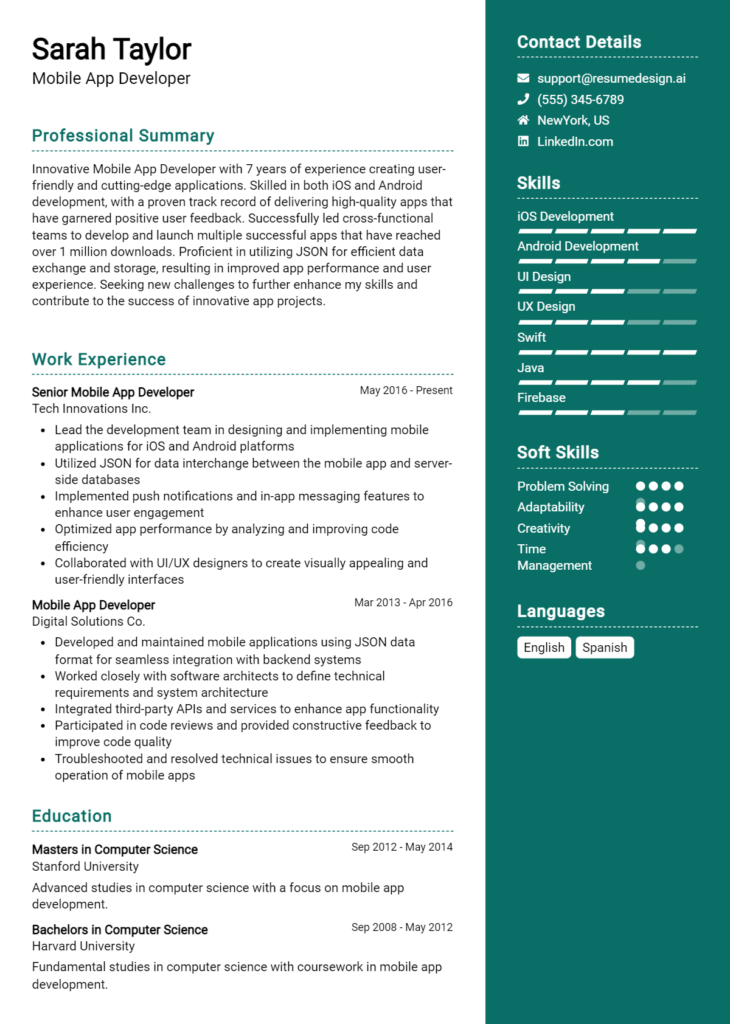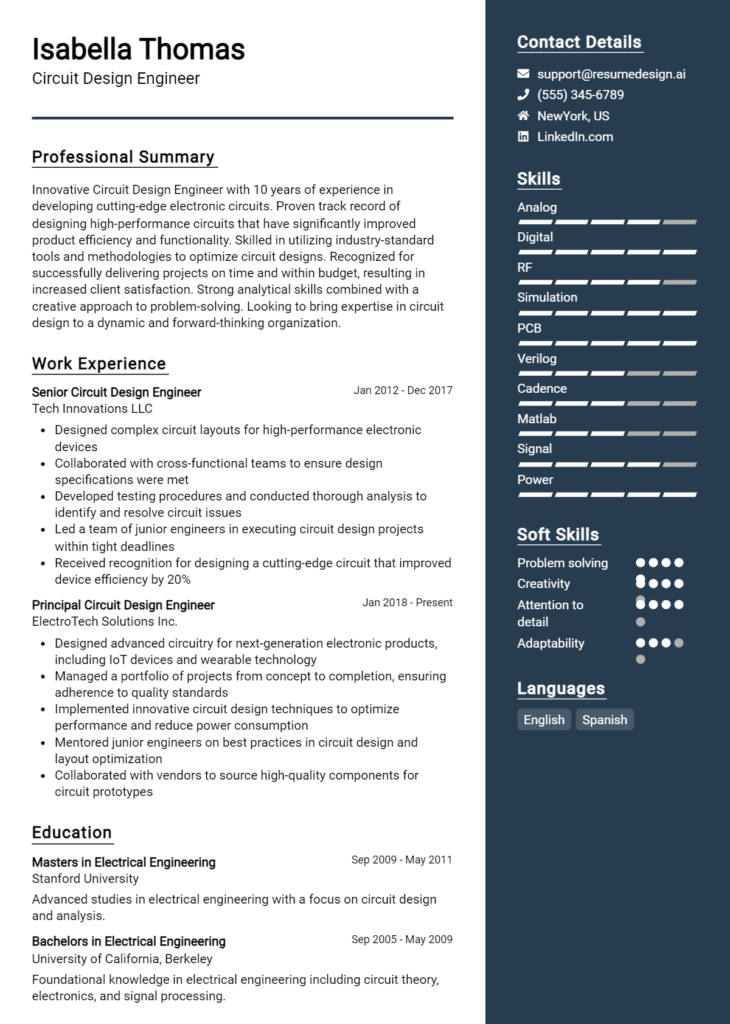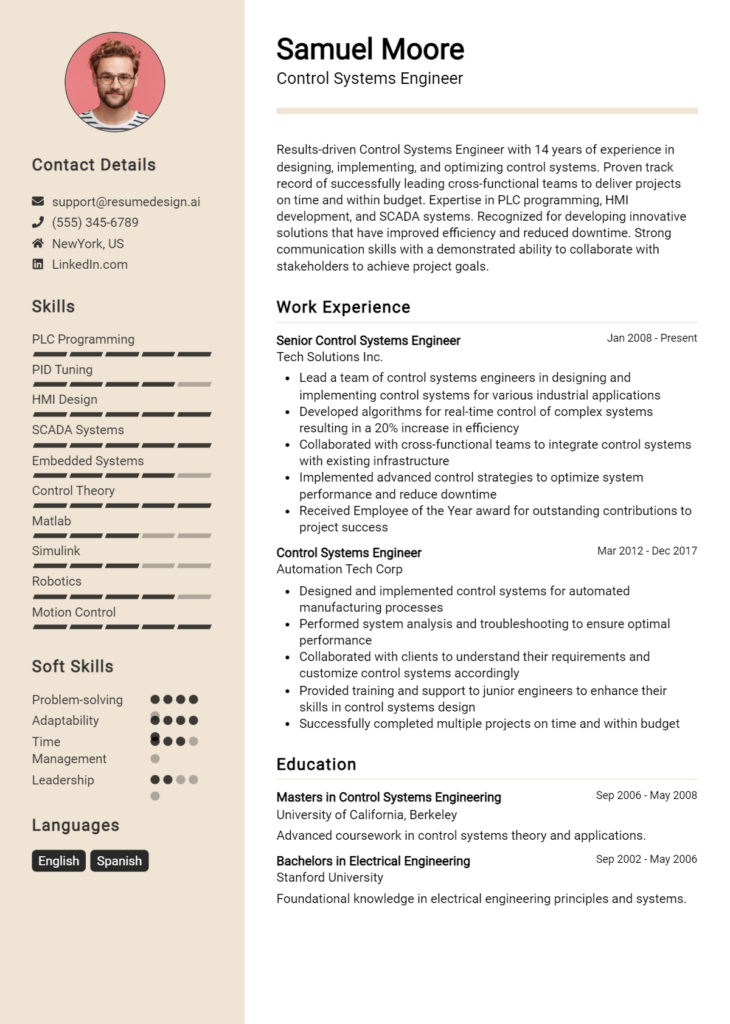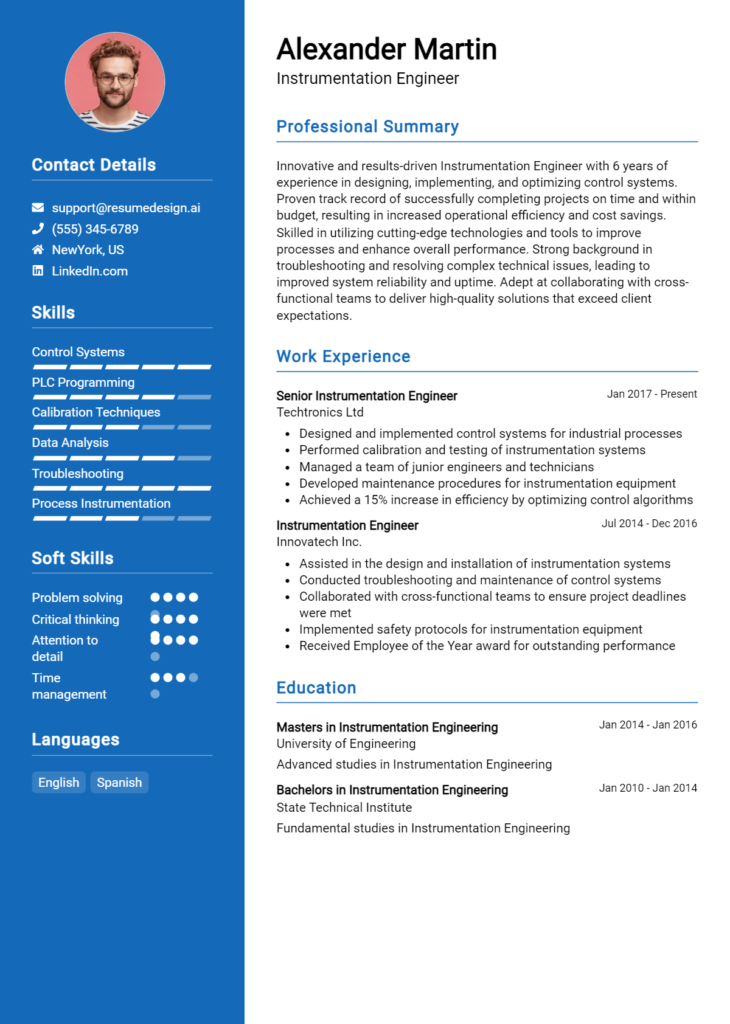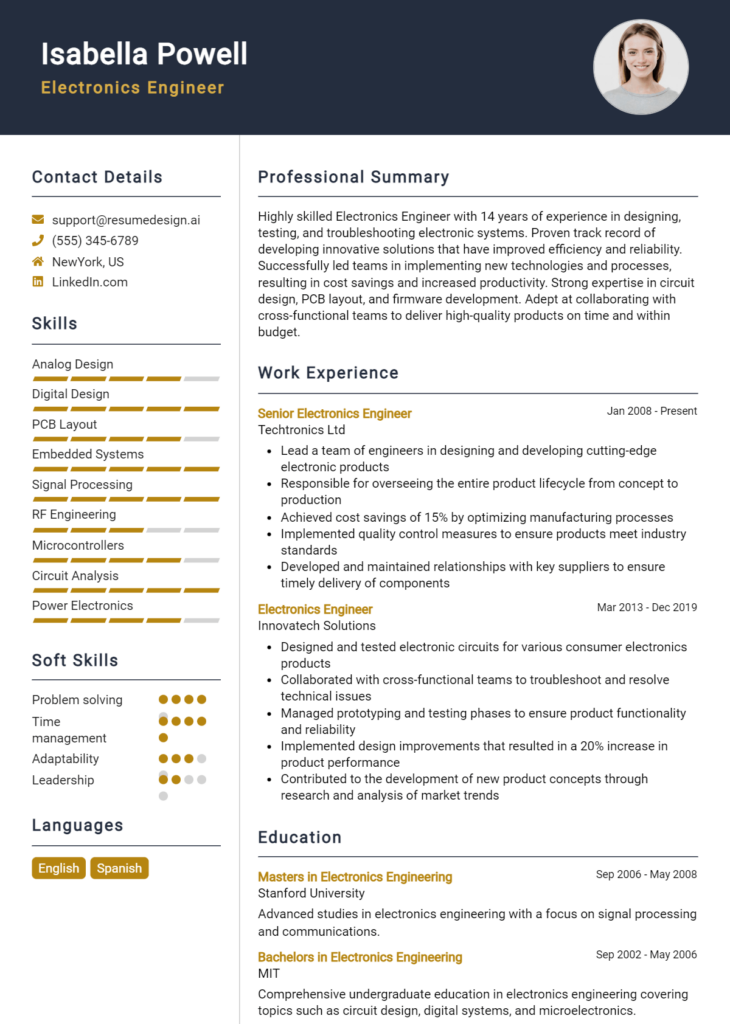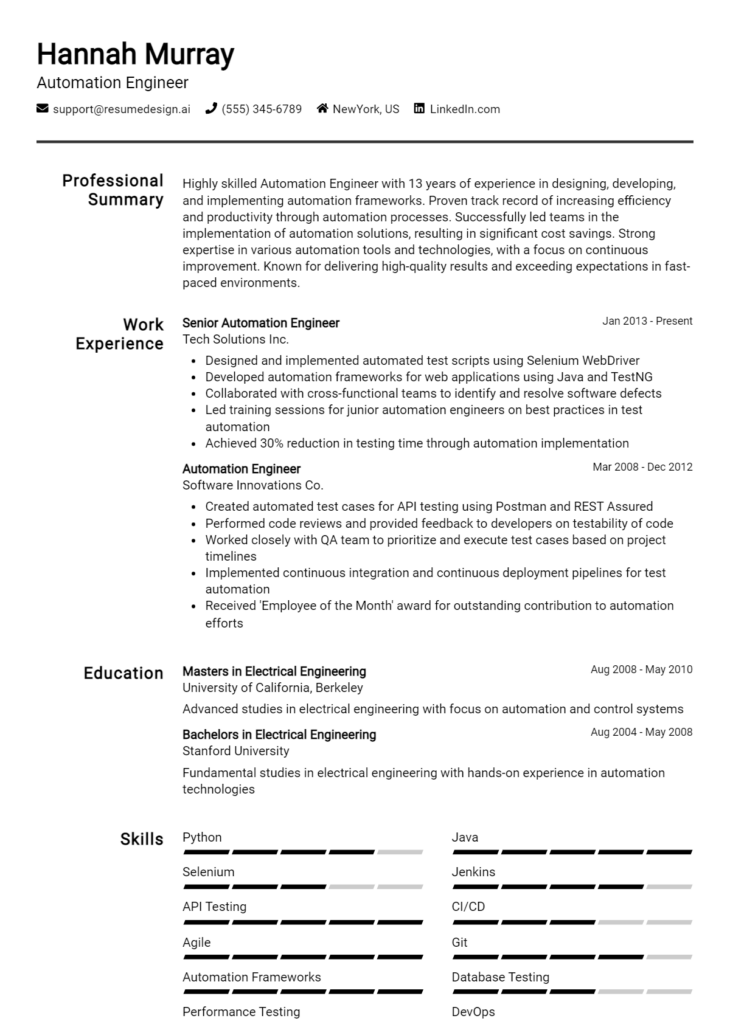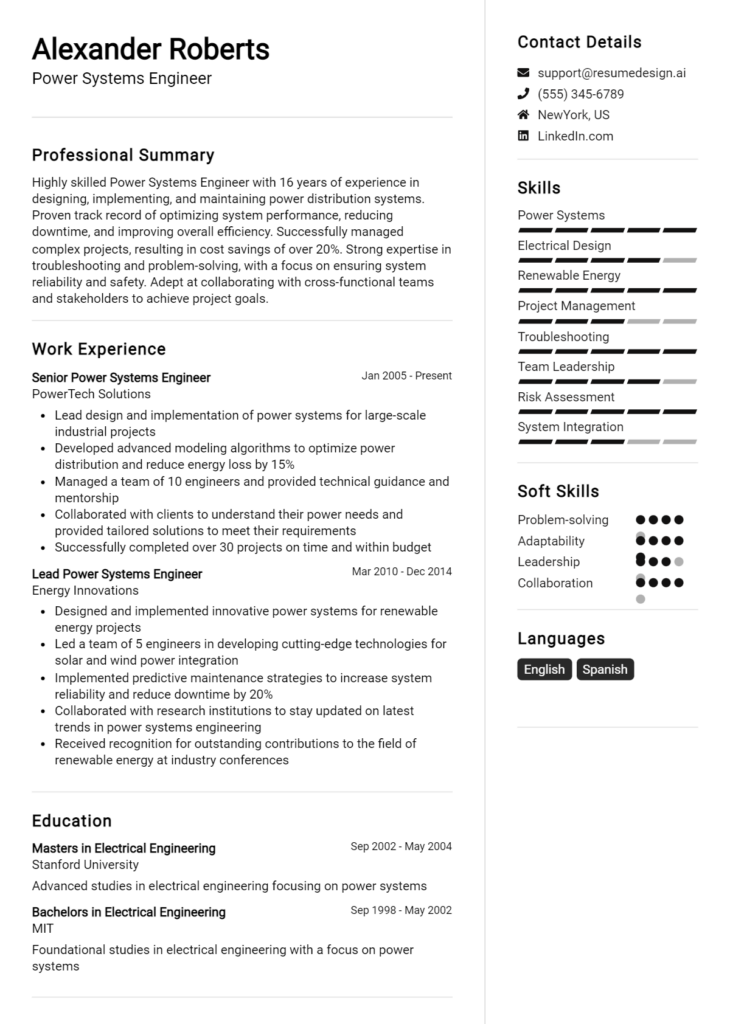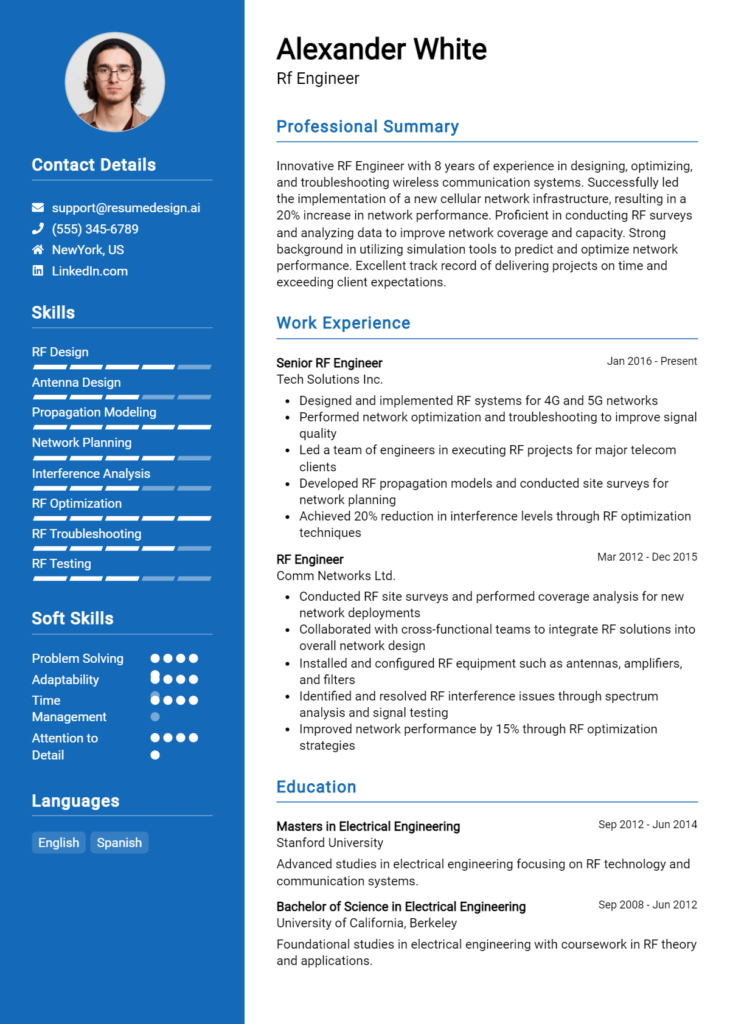Renewable Energy Engineer Core Responsibilities
A Renewable Energy Engineer is pivotal in designing, implementing, and optimizing renewable energy systems, requiring strong technical, operational, and problem-solving skills. This role bridges various departments, including engineering, environmental science, and project management, ensuring collaboration towards sustainable energy solutions. Successful engineers must analyze data, develop innovative designs, and troubleshoot issues effectively. These skills are vital for advancing organizational goals in sustainability and efficiency. A well-structured resume highlighting these qualifications can significantly enhance job prospects.
Common Responsibilities Listed on Renewable Energy Engineer Resume
- Design and develop renewable energy systems, including solar, wind, and biomass technologies.
- Conduct feasibility studies to assess project viability and environmental impact.
- Collaborate with cross-functional teams to integrate renewable solutions into existing infrastructures.
- Perform energy audits and recommend energy efficiency improvements.
- Monitor and analyze system performance to optimize energy production.
- Stay updated on industry trends, regulations, and technological advancements.
- Prepare detailed reports and presentations for stakeholders.
- Manage project timelines, budgets, and resources effectively.
- Conduct research to develop innovative renewable energy technologies.
- Ensure compliance with safety and environmental regulations.
- Provide technical support and training to operational staff.
- Evaluate potential sites for renewable energy installations.
High-Level Resume Tips for Renewable Energy Engineer Professionals
In the competitive field of renewable energy, a well-crafted resume is not just a formality; it's a critical tool that can open doors to exciting career opportunities. As a Renewable Energy Engineer, your resume is often the first impression you make on potential employers, and it needs to effectively showcase your skills, expertise, and achievements. A thoughtfully designed resume can set you apart from the competition, emphasizing your unique qualifications in a rapidly evolving industry. This guide will provide practical and actionable resume tips specifically tailored for Renewable Energy Engineer professionals, helping you to present your best self on paper.
Top Resume Tips for Renewable Energy Engineer Professionals
- Tailor your resume to each job description by highlighting relevant skills and experiences that match the specific requirements.
- Showcase your hands-on experience with renewable energy projects, including any internships or volunteer work that demonstrate your commitment to the field.
- Quantify your achievements by including metrics such as energy savings, project costs, or efficiency improvements to provide concrete evidence of your impact.
- Highlight industry-specific skills such as knowledge of solar, wind, or hydroelectric systems, energy modeling, and environmental regulations.
- Include relevant certifications or licenses that validate your expertise, such as LEED accreditation or certification in a specific renewable technology.
- Utilize action verbs to convey your contributions effectively; words like "designed," "implemented," and "optimized" can make your accomplishments stand out.
- Keep your resume concise and focused, ideally one page, while ensuring all relevant information is clearly presented and easy to read.
- Incorporate keywords from the job posting to help your resume pass through applicant tracking systems (ATS) that many companies use.
- Include a professional summary at the top of your resume that succinctly outlines your experience, skills, and what you bring to the table as a Renewable Energy Engineer.
By implementing these tips, you can significantly enhance your resume's effectiveness, increasing your chances of landing a job in the Renewable Energy Engineer field. A focused and well-structured resume not only highlights your qualifications but also demonstrates your dedication to advancing sustainable energy solutions, making you a more attractive candidate to potential employers.
Why Resume Headlines & Titles are Important for Renewable Energy Engineer
In the competitive field of renewable energy engineering, a well-crafted resume headline or title plays a crucial role in capturing the attention of hiring managers. A strong headline serves as a powerful first impression, summarizing a candidate's key qualifications and unique strengths in a concise and impactful phrase. Given the limited time hiring managers often spend reviewing resumes, an effective headline can differentiate a candidate from others, highlighting their relevance to the specific role being applied for. Therefore, it is essential for Renewable Energy Engineers to create headlines that are not only attention-grabbing but also aligned with the job requirements.
Best Practices for Crafting Resume Headlines for Renewable Energy Engineer
- Keep it concise: Limit your headline to one impactful sentence.
- Be role-specific: Tailor your headline to reflect the position you are applying for.
- Highlight key skills: Incorporate important skills that are relevant to the renewable energy sector.
- Showcase achievements: Mention any notable accomplishments that set you apart.
- Use industry keywords: Incorporate terminology commonly used in renewable energy to align with job descriptions.
- Avoid jargon: Ensure that your headline is easily understood by a broad audience.
- Make it dynamic: Use action words to convey energy and enthusiasm.
- Test different versions: Experiment with different headlines to see which resonates best.
Example Resume Headlines for Renewable Energy Engineer
Strong Resume Headlines
"Innovative Renewable Energy Engineer with 8+ Years in Solar System Design and Implementation"
"Results-Driven Energy Engineer Specializing in Sustainable Solutions and Project Management"
“Certified Renewable Energy Specialist with Proven Track Record in Wind Farm Development”
“Dynamic Engineer with Expertise in Energy Efficiency and Green Building Technologies”
Weak Resume Headlines
“Engineer Seeking Opportunities”
“Looking for a Job in Renewable Energy”
The strong headlines are effective because they clearly convey the candidate's expertise, experience, and specific skills relevant to renewable energy engineering. They are tailored to the job and utilize industry-specific terms, making them compelling and relevant. In contrast, the weak headlines fail to make an impact due to their vague language and lack of specificity. They do not provide any insight into the candidate's qualifications or what they can bring to the role, ultimately making them forgettable in a sea of applications.
Writing an Exceptional Renewable Energy Engineer Resume Summary
A well-crafted resume summary is a pivotal element for a Renewable Energy Engineer, as it serves as the first impression for hiring managers. In a competitive job market, a strong summary quickly captures attention by showcasing key skills, relevant experience, and notable accomplishments tailored specifically to the job role. This brief yet impactful section not only highlights the candidate's qualifications but also sets the tone for the rest of the resume, encouraging hiring managers to delve deeper into the applicant's background. A concise, focused summary is essential for making a lasting impression and increasing the chances of securing an interview.
Best Practices for Writing a Renewable Energy Engineer Resume Summary
- Quantify Achievements: Use numbers to highlight your impact, such as energy savings percentages or project budgets managed.
- Focus on Relevant Skills: Highlight skills that are directly applicable to the job, like project management, renewable energy systems design, or regulatory compliance.
- Tailor for the Job Description: Customize your summary to reflect the specific requirements and keywords found in the job posting.
- Be Concise: Aim for 2-4 sentences that convey your qualifications clearly without unnecessary fluff.
- Showcase Technical Proficiency: Mention specific technologies or software you are skilled in, such as solar PV design or energy modeling software.
- Highlight Certifications: If applicable, include relevant certifications like LEED or PMP to bolster your credibility.
- Emphasize Soft Skills: Incorporate soft skills such as teamwork, leadership, and communication that are vital in engineering roles.
- Use Action Verbs: Start sentences with strong action verbs to convey confidence and proactivity.
Example Renewable Energy Engineer Resume Summaries
Strong Resume Summaries
Results-driven Renewable Energy Engineer with over 8 years of experience in solar energy project management, successfully leading projects that reduced energy costs by 30% for commercial clients. Proficient in energy modeling and design software, with a proven track record of implementing innovative solutions that enhance system efficiency and compliance with regulatory standards.
Dynamic Renewable Energy Engineer specializing in wind energy systems, with a strong focus on optimizing turbine performance. Spearheaded a project that increased energy output by 15% while maintaining compliance with environmental regulations, resulting in a savings of $500,000 annually for the company.
Dedicated Renewable Energy Engineer with expertise in battery storage systems and grid integration. Led a cross-functional team to develop a renewable microgrid project that powered 1,500 homes, achieving a 25% reduction in carbon emissions and earning recognition from the local government.
Weak Resume Summaries
Experienced engineer looking for a job in renewable energy. I have worked on various projects and have some skills in this area.
I am a Renewable Energy Engineer with a background in engineering. I want to help companies with energy projects.
The strong resume summaries are considered effective because they provide specific, quantifiable outcomes that demonstrate the candidate's impact in their previous roles. They clearly highlight relevant skills and experiences tailored to the renewable energy field, making them stand out to hiring managers. In contrast, the weak summaries are vague, lacking measurable achievements and detailed descriptions of skills or experiences, which fails to capture the attention of employers or convey the candidate's qualifications effectively.
Work Experience Section for Renewable Energy Engineer Resume
The work experience section of a Renewable Energy Engineer resume is crucial as it serves as a comprehensive showcase of the candidate's technical skills and professional accomplishments. This section illustrates the engineer's ability to manage teams effectively while delivering high-quality renewable energy solutions. By quantifying achievements and aligning experiences with industry standards, candidates can demonstrate their impact on projects and their capability to drive innovation in the renewable energy sector.
Best Practices for Renewable Energy Engineer Work Experience
- Highlight specific technical skills relevant to renewable energy technologies, such as solar, wind, or biomass.
- Quantify your achievements with metrics, such as energy savings, project budgets, or timelines met.
- Describe your role in team projects to showcase your collaboration and leadership capabilities.
- Use industry-standard terminology to align your experience with the expectations of hiring managers.
- Focus on results-oriented statements that emphasize the impact of your contributions.
- Tailor your work experience to match the specific job description of the position you're applying for.
- Include any relevant certifications or licenses that demonstrate your expertise in renewable energy.
- Maintain a clear and concise format that enhances readability and emphasizes key achievements.
Example Work Experiences for Renewable Energy Engineer
Strong Experiences
- Led a cross-functional team that designed and implemented a 5 MW solar farm, resulting in a 20% reduction in energy costs for the local community.
- Developed a wind energy project that increased local energy production by 15%, generating an additional $1 million in revenue within the first year.
- Managed the installation of energy-efficient systems in over 50 commercial buildings, achieving an average energy savings of 30% across the portfolio.
- Conducted feasibility studies for renewable energy projects that secured $2 million in government funding, facilitating project development and execution.
Weak Experiences
- Worked on various renewable energy projects.
- Assisted in the development of energy solutions.
- Participated in team meetings and discussions.
- Helped to improve project outcomes.
The strong experiences listed above are considered effective because they are specific, quantifiable, and demonstrate significant contributions to projects. They reflect the candidate's ability to lead, innovate, and deliver measurable results in the renewable energy sector. In contrast, the weak experiences lack detail and impact, failing to convey the candidate's technical capabilities or the value they brought to their previous roles. This highlights the importance of clear, results-oriented statements that resonate with potential employers.
Education and Certifications Section for Renewable Energy Engineer Resume
The education and certifications section of a Renewable Energy Engineer resume is crucial for showcasing a candidate's academic qualifications and professional credentials. This section serves to highlight the individual's foundational knowledge in engineering principles, as well as their specialized training in renewable energy technologies. Including relevant coursework and industry-recognized certifications not only enhances the candidate's credibility but also demonstrates their commitment to continuous learning and adaptation in a rapidly evolving field. A well-crafted education and certifications section can greatly improve alignment with the job role, making it an essential component of a successful application.
Best Practices for Renewable Energy Engineer Education and Certifications
- Focus on relevant degrees such as Environmental Engineering, Renewable Energy, or Sustainable Design.
- Include industry-recognized certifications, such as LEED, NABCEP, or specific renewable energy technology certifications.
- Provide details of specialized training programs or workshops that enhance technical skills.
- List relevant coursework that directly pertains to renewable energy systems and technologies.
- Highlight any ongoing education efforts, such as online courses or seminars in renewable energy topics.
- Ensure the information is up-to-date and accurately reflects your current qualifications.
- Organize the section in a clear, easy-to-read format, prioritizing the most relevant qualifications.
- Consider including any honors or distinctions received in the context of your education or certifications.
Example Education and Certifications for Renewable Energy Engineer
Strong Examples
- B.S. in Environmental Engineering, University of California, 2020
- Certified Renewable Energy Professional (REP) from the Association of Energy Engineers
- Relevant Coursework: Solar Energy Systems, Wind Energy Engineering, and Energy Policy Analysis
- Completed a training program on Energy Storage Technologies at the National Renewable Energy Laboratory (NREL)
Weak Examples
- B.A. in History, University of New York, 2018
- Certification in Microsoft Office, 2021
- Completed a workshop on Public Speaking, 2020
- High School Diploma, 2015
The strong examples are deemed effective as they directly align with the skills and knowledge required for a Renewable Energy Engineer, showcasing relevant degrees and certifications that demonstrate the candidate's expertise in the field. Conversely, the weak examples highlight qualifications that lack relevance to renewable energy engineering, such as degrees in unrelated fields and certifications that do not pertain to the industry. These distinctions emphasize the importance of tailoring educational qualifications to match the demands of the role effectively.
Top Skills & Keywords for Renewable Energy Engineer Resume
In the rapidly evolving field of renewable energy, the significance of showcasing the right skills on a resume cannot be overstated. A Renewable Energy Engineer must not only possess technical expertise but also demonstrate a range of soft skills that are crucial for collaboration, problem-solving, and innovation. Highlighting these skills effectively can make a candidate stand out to potential employers, showcasing their readiness to contribute to sustainable energy solutions. As the industry grows, so does the need for professionals who can adapt to new technologies and methodologies, making a well-crafted resume essential for career advancement.
Top Hard & Soft Skills for Renewable Energy Engineer
Soft Skills
- Team Collaboration
- Communication Skills
- Problem-Solving
- Adaptability
- Critical Thinking
- Time Management
- Project Management
- Creativity
- Leadership
- Negotiation Skills
- Customer Service Orientation
- Attention to Detail
- Conflict Resolution
- Strategic Planning
- Initiative
- Interpersonal Skills
- Emotional Intelligence
- Cultural Awareness
Hard Skills
- Proficiency in Renewable Energy Technologies
- Energy Modeling and Simulation
- Data Analysis and Interpretation
- Project Design and Implementation
- Knowledge of Regulatory Standards
- Proficient in CAD Software
- Familiarity with Energy Storage Systems
- Understanding of Electrical Systems
- GIS Mapping and Analysis
- Performance Monitoring and Analysis
- Financial Analysis and Budgeting
- Technical Report Writing
- Environmental Impact Assessment
- Software Proficiency (e.g., MATLAB, Python)
- System Integration Techniques
- Resource Assessment Techniques
- Knowledge of Grid Management Systems
By effectively integrating these skills into your resume and pairing them with relevant work experience, you can create a compelling narrative that highlights your qualifications for a career in renewable energy engineering.
Stand Out with a Winning Renewable Energy Engineer Cover Letter
I am writing to express my interest in the Renewable Energy Engineer position at [Company Name], as advertised on [Job Board/Company Website]. With a Master’s degree in Renewable Energy Engineering and over [X years] of experience in designing and implementing sustainable energy solutions, I am excited about the opportunity to contribute to your team. My background in solar power systems and wind energy technology, combined with a strong analytical skill set, has equipped me to tackle the challenges associated with transitioning to renewable energy sources.
During my previous role at [Previous Company Name], I successfully led a project that increased the efficiency of our solar panel installations by 20%, ultimately reducing costs and enhancing energy output. This experience allowed me to develop a comprehensive understanding of energy modeling, site assessment, and regulatory compliance, which I believe will be invaluable in my role at [Company Name]. I have also collaborated with multidisciplinary teams to ensure that projects meet both technical specifications and sustainable practices, demonstrating my ability to communicate effectively and work towards common goals.
I am particularly drawn to [Company Name] because of its commitment to innovation and sustainability in the renewable energy sector. I admire your recent initiatives in [specific project or initiative], and I believe that my proactive approach and passion for clean energy align perfectly with your organization’s mission. I am eager to bring my expertise in renewable technologies and project management to your team, as well as my dedication to driving positive environmental change.
Thank you for considering my application. I look forward to the possibility of discussing how my skills and experiences align with the goals of [Company Name]. I am excited about the opportunity to contribute to meaningful projects that advance the renewable energy landscape and help create a sustainable future for generations to come.
Common Mistakes to Avoid in a Renewable Energy Engineer Resume
When applying for a position as a Renewable Energy Engineer, crafting a standout resume is crucial to catching the attention of potential employers. However, many candidates make common mistakes that can significantly diminish their chances of success. Understanding these pitfalls will help you create a compelling and effective resume that showcases your qualifications and passion for renewable energy.
Lack of Tailoring: Failing to customize your resume for each job application can make it generic. Highlight relevant skills and experiences that align with the specific position you're applying for.
Overloading with Technical Jargon: While technical expertise is essential, using excessive jargon can alienate hiring managers who may not be familiar with all the terms. Aim for clarity and ensure your skills are communicated effectively.
Ignoring Soft Skills: Renewable Energy Engineers often work in teams and need strong communication and problem-solving skills. Neglecting to mention these soft skills can make your resume less appealing.
Inadequate Project Descriptions: Simply listing projects without detailing your role and achievements can undermine your impact. Include specific contributions, technologies used, and results achieved to demonstrate your value.
Neglecting Relevant Certifications: Failing to highlight certifications specific to renewable energy can be a missed opportunity. Ensure that any relevant qualifications, such as LEED accreditation or NABCEP certification, are prominently displayed.
Using a Generic Format: A cluttered or overly complex resume format can detract from your content. Opt for a clean, professional layout that enhances readability and allows key information to stand out.
Not Including Quantifiable Achievements: Resumes that lack measurable outcomes can appear less impactful. Where possible, include statistics or metrics that showcase your successes, such as energy savings achieved or project budgets managed.
Omitting Professional Development: Renewable energy is a rapidly evolving field, and failing to mention ongoing education or training can suggest stagnation. Include workshops, seminars, or courses that reflect your commitment to staying current in the industry.
Conclusion
As a Renewable Energy Engineer, you play a pivotal role in designing and implementing sustainable energy solutions that combat climate change and promote environmental stewardship. Throughout this article, we explored the essential skills required for this role, including proficiency in renewable technologies such as solar, wind, and bioenergy. We also discussed the importance of staying updated with industry trends and advancements, as well as the value of effective project management and teamwork in driving successful outcomes.
In conclusion, it's crucial to ensure that your resume reflects your expertise and aligns with the specific demands of the renewable energy sector. A well-crafted resume can help you stand out in a competitive job market. We encourage you to take the time to review your Renewable Energy Engineer resume and make necessary updates to highlight your qualifications and achievements.
To assist you in this process, we recommend utilizing a variety of resources that can enhance your resume and cover letter. Check out the resume templates to give your application a professional look, or use the resume builder for a user-friendly experience that helps you create a tailored resume. Additionally, browse through resume examples to get inspiration from successful candidates in your field, and don’t forget to explore cover letter templates to complement your application.
Take action today—revise your resume and leverage these tools to position yourself for success in the renewable energy industry!

